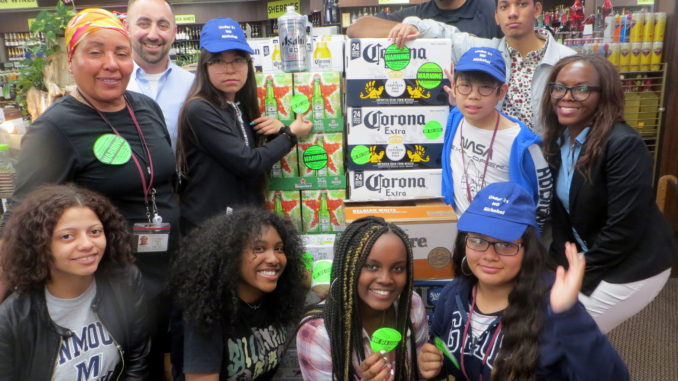
Young Englewood citizens are stepping up to the plate to prevent underage drinking.
On May 7, a group of students from the Janis E. Dismus Middle School and Dwight Morrow High School participated in “Sticker Shock,” a state-wide initiative. Locally it was conducted in coordination with the Englewood Health Department, the Englewood Police Department and the Bergen Family Center (BFC).
The Sticker Shock campaign in Englewood is part of an initiative of the Bergen County Prevention Coalition to bring awareness to underage drinking, one of that group’s priorities.
This year’s Englewood “Sticker Shock” program was led by Jim Fedorko and Caroline Machiri from the Englewood Health Department. They were assisted by Middle School Health Teacher Lisa Ogden and Detective Lt. Tom Greeley, the officer in charge of the Englewood Police Department Youth Services Unit, and EPD Detective Mike Chapman.
“Underage drinking is a nationwide problem and we need to take a proactive stance,” Greeley said. “‘The Sticker Shock’ program is important because it makes not only adolescents, but adults and the entire community aware. Middle school is the ideal venue for this program, because children at this age are aware of and are influenced by what goes on in the home and by their peers. Parents, older siblings, older friends, etc. are often unaware that they themselves can get into trouble along with the individual that is not of age.”
On May 7, the “Sticker Shock” program began at the Bergen Family Center’s teen center, where Machiri showed a Power Point presentation about the dangers of alcohol for adolescents.
It illustrated why the National Institute on Alcohol Abuse and the Centers for Disease Control have identified underage drinking as an epidemic, with a report that alcohol is the most widely used substance of abuse among America’s youth. In 2017, one out of six teenagers admit to having engaged in binge drinking and experienced alcohol induced blackouts.
According to the Substance Abuse and Mental Health Services Administration, adults who had their first drink before the age of 15 were seven times more likely to experience alcohol problems than those who had not started drinking before the age of 21.
The slides gave an overview of how alcohol disrupts brain growth and function and they described the medical, behavioral and social problems in teens whose brains are not fully formed (until age 27). Particularly compelling were the facts that besides alcohol being implicated in numerous car crashes every year, the National Council on Alcoholism and Drug Dependency reports that over 50% of all sexual assault cases of college students, including date rape, have been involved with alcohol abuse. Alcohol use also increases the risk of teen suicide.
On the topic of alcohol poisoning, Machiri and Greeley explained that the Good Samaritan Law protects people from reporting intoxication emergencies without fear of prosecution and encouraged the students to call for help if a friend passes out from binge drinking.
Next, Lt. Greeley spoke with the students about the police department’s involvement in Sticker Shock.
“We want to ensure that people do not make alcohol available to people under 21 years of age. Hopefully, you already have a plan for your parents to pick you up from a place where underage drinking is taking place.”

Liz Corsini, vice president of the Bergen Family Center, who was also present at the BFC meeting, advised the students that if they have or see a drinking problem in school, they should go to the guidance counselor.
After the presentation and group discussion, the students were driven in a van from the BFC on Armory Street to Oprandy’s Wine and Liquor Store, Shoprite Wines and Spirits and C & R Beverage. Greeley and Chapman followed the group in their police car.
Fedorko said that “The Englewood Health Department has been conducting Sticker Shock for the last five years, and the cooperation of the liquor store owners has been excellent.”
At each liquor store, the students donned hats that read, “Under 21. No Alcohol,” and they attached stickers and hangers to alcoholic beverages and products that appeal to minors, such as beer. They also put hangers on bottles of alcoholic products throughout the store to discourage adults and peers who are 21 or over from providing alcohol to minors.
The stickers and bottle hangers placed on the products throughout the store act as “warning” labels to inform the public of the consequences they can face if they provide or purchase alcohol for minors.
According to Fedorko, “The message comes in loud and clear when minors are the ones spreading the word and taking action.”
